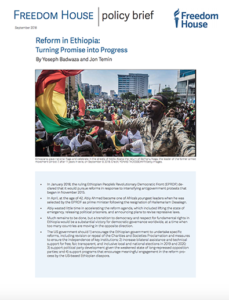 After more than two years of protests, power changed hands in Ethiopia last April. Under the new Prime Minister Abiy Ahmed, Ethiopia is shedding its reputation as a country that tortures detainees and spies on its citizens, notes Human Rights Watch. The authorities have released thousands of political prisoners and dismissed some abusive security force officers. The decades-long conflict with neighboring Eritrea came to an end. And for the first time in eight years, Human Rights Watch staff who cover Ethiopia were permitted to visit the country.
After more than two years of protests, power changed hands in Ethiopia last April. Under the new Prime Minister Abiy Ahmed, Ethiopia is shedding its reputation as a country that tortures detainees and spies on its citizens, notes Human Rights Watch. The authorities have released thousands of political prisoners and dismissed some abusive security force officers. The decades-long conflict with neighboring Eritrea came to an end. And for the first time in eight years, Human Rights Watch staff who cover Ethiopia were permitted to visit the country.
 In Ethiopia, Abiy Ahmed appears to be leading change with breathtaking speed, Afrobarometer analyst Robert Mattes writes for the Washington Post. But the reform process needs international assistance to maintain momentum towards sustainable democratization, observers suggest.
In Ethiopia, Abiy Ahmed appears to be leading change with breathtaking speed, Afrobarometer analyst Robert Mattes writes for the Washington Post. But the reform process needs international assistance to maintain momentum towards sustainable democratization, observers suggest.
“We are looking very hard at ways that we can resource our support for the reform agenda beyond the traditional areas of development and humanitarian assistance we have been sustaining and continue to sustain,” said Michael Raynor, the US Ambassador to Addis Ababa.
Additional support on democracy, electoral support, civil society, and to create robust private media will “prepare all the conditions needed to support credible elections,” he noted.
The United States of America will continue to provide the necessary support to further underpin the ongoing reform in Ethiopia, said Karen Bass, Congresswoman and Chair of the House of Foreign Affairs Sub-Committee on Africa.
 “I was excited at the changes and reforms that are taking place here and it was great to be back and I am leaving with a long to do list of things that I need to do when I get back to Washington to help in anyway and every way we can to further the reforms here in Ethiopia,” said Bass, a board member of the National Endowment for Democracy.
“I was excited at the changes and reforms that are taking place here and it was great to be back and I am leaving with a long to do list of things that I need to do when I get back to Washington to help in anyway and every way we can to further the reforms here in Ethiopia,” said Bass, a board member of the National Endowment for Democracy.
Nevertheless, there has been stiff resistance to some of the reforms, observers suggest, while some analysts fear that a slide towards the personalization and deinstitutionalization of power could lead to a sort of “illiberal democracy.”







